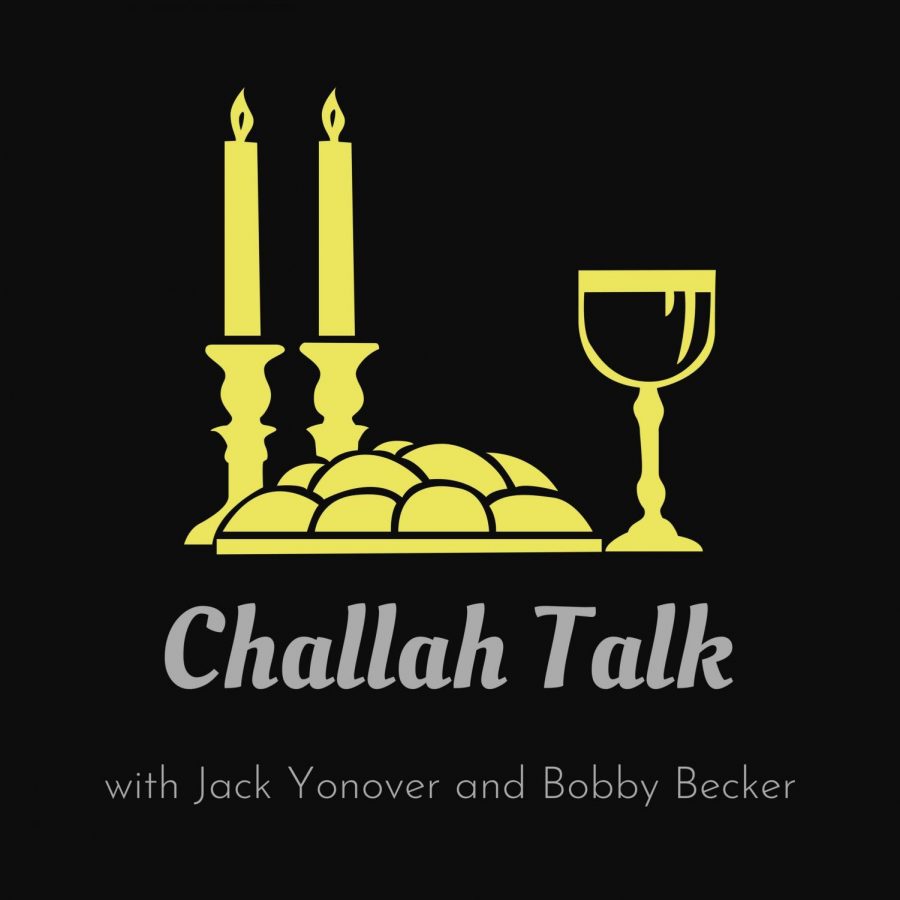Challah Talk: nosh, banter, and deep thoughts
The recording studio is electric today, just like it is every Thursday. Seniors Jack Yonover and Bobby Becker have created something quite unique: A podcast entitled “Challah Talk.” Of their five shows, each one has had more listeners than the last.
Challah is a bread in Jewish cuisine usually eaten on Shabbat and major Jewish holidays. Becker and Yonover, both Jews themselves, eat the braided bread all the time. The weekly shows allow them, as Yonover put it, to “nosh on some Challah” even more often.
“The thesis of the show is that Challah bread is the basis for good conversation. It’s just three people in a room just having the type of conversation you’d have atlunch,” said Yonover. “Challah is the icebreaker to a great conversation.”
The first episode was with senior Brian Joseph. Yonover and Becker discussed everything with him, including his golf career, his family origins in Haiti, his interest in the Air Force, and his opinions on the N-word discussions in advisory.
Joseph gave the show high praise.
“Jack and Bobby have put together a wonderful podcast that showcases some of New Trier’s most interesting personalities and perspectives, and to have been chosen to share a bit about myself and some of my thoughts on several New Trier events was wonderful,” he said.
According to Becker, the most important component to the show is
the guest.
“We want to capture the stories
of different types of people at New Trier. That’s why we selected five unique individuals to introduce to a larger audience.”
So far, besides Joseph,the show has hosted seniors Jordan Shonfeld, Max Rosen, Ayah Bajwa, and Nate Schinderle.
“I want someone who can be real, someone who is interesting and who has a unique background, but we also want diverse voices,” said Becker
Becker and Yonover created an Instagram account for the podcast, and have asked friends and listeners to promote it on their personal accounts. The viewership has been much higher than Yonover and Becker anticipated it would be.
“Our analytics tell us we’ve had over 1,500 plays over the first five episodes, and on Instagram we’ve been growing rapidly. At one point, I know we had more than 1,000 page views in one week,” Becker said.
Senior Sawyer Harris, a frequent Challah Talk listener, spoke highly of the show’s relatability.
“The aspect of the show that grabs me the most is how everyone is so down to earth,” Harris said. “Hearing my peers talk about their lives and interests gives everything a sense of relatability. At the end of a long day there’s nothing better than listening to interesting people talk about interesting subjects, not to mention how funny the show is.”
Yonover credited the support of his friends in the beginning for the success of Challah Talk.
“I honestly don’t know if I would’ve gone through with it if I hadn’t gotten the response I did. But a good idea doesn’t equal good execution, so we thought we’d start the show and see what would happen. I certainly didn’t expect it to be as popular as it is now,” said Yonover.
Joseph has become a big fan and complimented the other guests.
“Each guest has their own unique qualities, interests, and talents, and to listen to what some of my peers have had to say is intriguing,” he said. “To have been the first guest on Challah Talk was a great experience. I look forward to witnessing the podcast’s continued growth and success.”
The planning for each show is quite simple, Becker and Yonover said.
“We start out with the background of the guest, how we can tailor the episode to them,” Yonover said. “What are their interests? What makes them unique from other students?”
“No one wants to hear us talk, they want to hear our guest talk,” Becker added. “It’s our job as the hosts to get the most out of them.” While they talk about a range of topics, they always try to have fun.
“In Ayah [Bajwa’s] show, the Challah was so good that the prophet Elijah ran into the recording studio and stole it for himself,” Yonover claimed.
“For [the episode with Jordan Shonfeld] we did a game about famous Jordans,” Becker said with a smile.
In that same show, the conversation started with Shonfeld’s experience as New Trier track and field captain, but by the end he was explaining the social hierarchy of turkeys.
“We never write out a script,” Yonover said. “We want our conversations to be as genuine and real as possible. I usually write out a list of things I want to talkabout, but we let our guests take the conversations the way they want to take it.”
Becker expressed gratitude to Mr. Syrek, the WNTH Radio sponsor, for giving them the space and opportunity to record the podcast each week.
“[Syrek] has been so helpful in this process. He lets us talk about the things we want to talk about, things we can’t necessarily discuss on live radio through WNTH,” Yonover agreed.
“One thing that’s unfortunate about WNTH radio is that you can’t talk about politics, you can’t approach many interesting topics we want to approach, he said. “With Challah Talk as a podcast, we have a little more freedom.”
Becker and Yonover have plans for the show’s future.
“We plan to end Season 1 by winter break, and the ultimate goal is to make it more accessible and popular. We don’t want to have the same show each week, so we’re looking to spice it up for Season 2.”
If you want to listen to Challah Talk, you can find the episodes on Spotify, Apple Podcasts, and pretty much any site that hosts podcasts








































